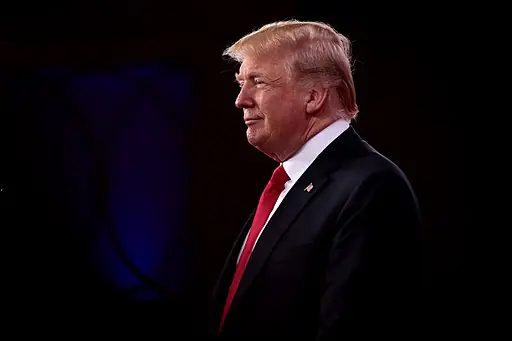Former President Donald Trump escalates personal attacks against Vice President Harris, urging her impeachment amid rising tensions in the lead-up to the election
As the countdown to the November election intensifies, former President Donald Trump ramped up his rhetoric against Vice President Kamala Harris during a campaign rally in Erie, Pennsylvania. In front of a boisterous crowd, Trump called for Harris to be “impeached and prosecuted,” further deepening the divide in an already contentious political landscape.
Trump’s remarks came as he criticized the Biden-Harris administration’s immigration policies, which he described as an “invasion” at the U.S.-Mexico border. He asserted, “She should be disqualified. She should resign the vice presidency and go home to California.” His audience responded with enthusiastic applause, underscoring the rally’s charged atmosphere.
In his speech, Trump made baseless allegations against Harris, linking her to the actions of undocumented immigrants and claiming responsibility for the deaths of innocent people. “She should be impeached and prosecuted for her actions,” he stated, echoing a familiar theme of targeting political opponents. This rhetoric aligns with Trump’s longstanding practice of threatening legal action against rivals, which has included previous targets such as President Joe Biden and Hillary Clinton.
Embed from Getty ImagesHarris recently visited the border for the first time in over three years, delivering a speech in Douglas, Arizona, where she emphasized the need for enhanced security measures. During her visit, she criticized Trump for derailing a bipartisan bill that aimed to address border issues, reinforcing the notion that immigration remains a critical point of contention in the election.
Polls indicate that immigration is a significant concern for voters, with a recent ABC News/Ipsos survey revealing that 70% view it as an important issue. Interestingly, Trump leads Harris by ten points among those who believe he is better suited to handle the immigration crisis, which may explain his aggressive stance on the topic.
Despite calls from Republican allies for Trump to focus on substantive issues rather than personal attacks, his recent comments have taken a more extreme turn. At the same rally, he referred to Harris as “mentally disabled,” a remark that mirrors similar comments made at a previous event. “Crooked Joe became mentally impaired. Sad. But lying Kamala Harris, honestly, I believe she was born that way,” he quipped, questioning her competence and credibility.
Majority Whip Tom Emmer, who is involved in preparing for the upcoming vice presidential debate, refrained from openly condemning Trump’s remarks but acknowledged the need to focus on issues. When asked about Trump’s comments, Emmer said, “I think we should stick to the issues,” indicating a desire among some Republicans to pivot away from personal attacks and toward substantive policy discussions.
As the election date draws closer, the tone of Trump’s rhetoric raises questions about the potential ramifications for both the Republican party and the electoral landscape. The interplay between immigration policy and personal attacks will likely dominate the campaign trail, shaping voter perceptions and engagement as November approaches.
Analysis
Political Perspective
Trump’s rally and calls for Harris’s impeachment highlight the ongoing polarization in American politics. By targeting a key figure in the Biden administration, Trump seeks to energize his base while simultaneously framing Harris as a liability for the Democrats. This tactic could galvanize support among voters dissatisfied with current immigration policies, potentially swaying undecided voters who prioritize border security.
The implications of Trump’s rhetoric also extend to the Republican party, where a divide is evident between those advocating for issue-focused campaigning and those who support aggressive personal attacks. As the party navigates its identity ahead of the election, Trump’s approach may influence other candidates’ strategies and campaign messages.
Social Perspective
The tone of Trump’s comments about Harris reflects broader societal issues surrounding gender and race in politics. The derogatory remarks directed at Harris can perpetuate harmful stereotypes about women, particularly women of colour, in positions of authority. Such statements may reinforce existing biases and contribute to a political culture that devalues female leadership.
The rally atmosphere, filled with cheers for Trump’s personal attacks, illustrates a segment of society that finds appeal in aggressive rhetoric. This phenomenon raises questions about the role of political discourse in shaping societal norms and values, particularly concerning respect for female leaders.
Racial Perspective
Trump’s attacks on Harris, a woman of South Asian and African American descent, also tap into racial dynamics in American politics. The use of derogatory language and questioning her competence plays into longstanding racial stereotypes that have historically marginalized individuals from diverse backgrounds. This dynamic can alienate voters who value inclusivity and representation, potentially impacting Harris’s support among key demographics.
Gender Perspective
Harris’s position as the first female vice president of the United States places her at the intersection of gender and power. Trump’s derogatory remarks not only undermine her authority but also reflect a broader societal struggle for female politicians to be taken seriously. As the campaign unfolds, Harris’s response to such attacks will be crucial in shaping perceptions of her leadership capabilities and resilience in the face of adversity.
Economic Perspective
The implications of Trump’s rhetoric extend into economic discussions, particularly regarding immigration. The framing of immigration as a crisis taps into fears about job security and economic stability. As voters express concerns over job competition from undocumented immigrants, Trump’s comments may resonate with those seeking economic reassurance. The economic landscape will likely play a significant role in shaping voter priorities as the election approaches.
